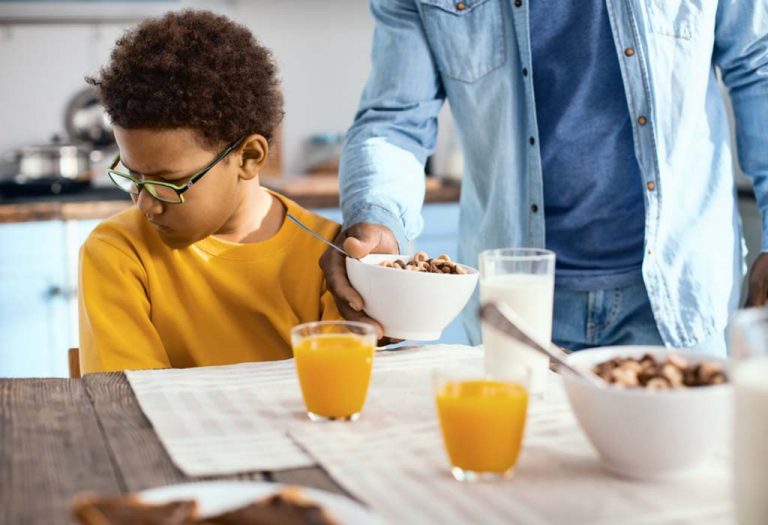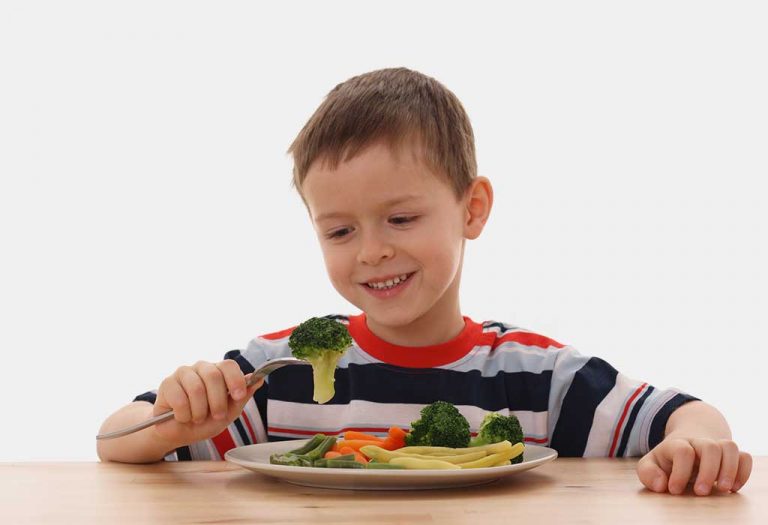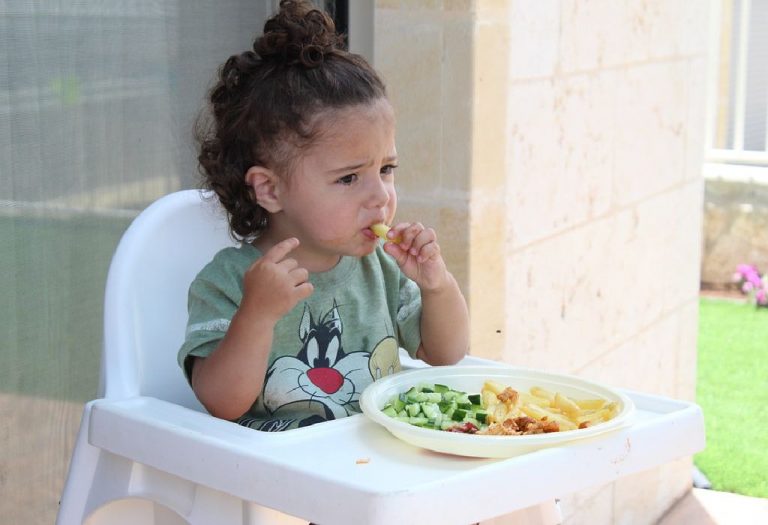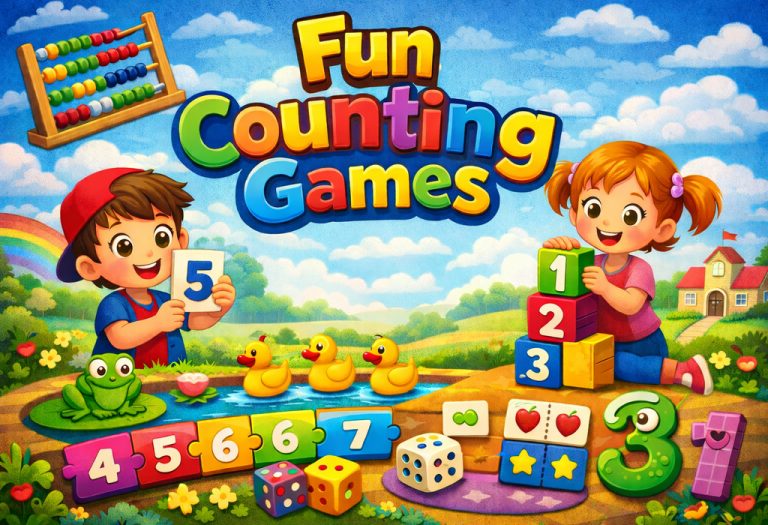Loss of Appetite in Kids – Causes and Remedies

If your child’s appetite has recently dwindled, it’s natural to feel concerned about their well-being. Understanding the reasons behind a loss of appetite in children can help you address the issue effectively. Factors such as illness, stress, or changes in routine can contribute to this temporary change in eating habits. To support your child’s digestive system, consider offering nutrient-rich foods that are appealing to them. Additionally, maintaining a positive and relaxed mealtime environment can encourage healthy eating habits. In this article, we’ll take a look at everything you need to know about the loss of appetite in children.
Causes of Loss of Appetite in Children
What causes a loss of appetite in children? Your child may lose his appetite for food due to:
1. Illness
If your child is suffering from stomach flu, diarrhoea or a fever, he may not feel like eating much (1).
2. Stress
Arguments and fights with siblings, bullying and unfortunate events like the death of a loved one can stress your child out and lead to a loss of appetite (2).
3. Depression
Did your little munchkin suddenly stop drawing and no longer want to touch a pencil or play her favourite game? You may mistake it for temporary sadness, but if this goes on for a prolonged period of time, it’s definitely depression (3).
4. Tapered Growth Rate
Your child’s growth and appetite will vary based on their age, energy levels, nutritional diet, and environment (4).
5. Anorexia Nervosa
Anorexia nervosa is a psychological disorder where your child gets obsessed with losing weight and goes for long periods of time without eating (5).
6. Prescription Drugs
If your child is on antibiotics or prescription drugs, their side effects may make his appetite go down.
7. Constipation
Constipation is another factor that causes a loss of appetite. You may need to tweak your child’s diet and modify his lifestyle.
8. Lack of Exercise
If your munchkin hesitates to go outside and play and wishes to be sedentary most of the time, he isn’t going to be very hungry at mealtime.
9. Snacking Between Meals
We’re sure you can’t see your child hungry and may give him a quick snack or two! But snacking between meals leaves kids feeling fuller for longer. The result – your child doesn’t finish the food on his plate.
10. Drinking Fluids and Juices
Sweetened (and natural) beverages are chock-full of calories. Drinking these beverages leads to a loss of appetite.
11. Distractions
If your child watches TV or a smartphone while eating, he may be less interested in the food on his plate.
12. Punishments
If you tell your child to finish the food even if he’s not hungry, he may begin hating food altogether. This, gradually, lowers the appetite.
13. Anaemia
Anaemia may be another reason for the loss of appetite in your child (6). Children suffering from anaemia look weaker, tired and more irritable than others.
14. Intestinal Worms
The presence of worms in your kid’s intestines can also make him eat lesser than usual. These worms can also lead to intestinal bleeding, dysentery, etc.
Ways to Cure and Prevent Loss of Appetite in Kids
You can treat as well as prevent a loss of appetite with these tips-
1. Give Many Small Meals
If your child can’t eat a lot in one go, split up three big meals into five to six small meals.
2. Change the Menu
Serve vitamin-B-rich fortified foods and whole-grain products enriched with iron, folic acid and other nutrients. Serve fruit bowls for dessert and vegetable soups for the finale. Parents can offer colourful and attractive dishes like beetroot halwa or gajar halwa as well as stuffed paratha with carrot, cabbage, and capsicum. They can make tikki or even make paneer or cheese vegetable stuffed pancakes. This way, parents can use different vegetables with a lot of variety.
3. Avoid Force-Feeding
Allow your child to eat just as much as he wants. Don’t compel him to take a second or third helping.
4. Let Him Help Out in the Kitchen
When you teach your child about nutrition, and allow him to help with cooking, he will automatically start taking more interest in food.
5. Keep the Devices Away
Be strict and say no to TV and video games during mealtime. It’s a good practice for all the family members to eat together.
6. Serve Beverages After (and Not Before) Meals
Juices and drinks are loaded with calories. So. it’s better to give them after your child has had his meal. YES, but this if made at home and without any sugar, it is healthy and can be added in between meals.
7. Have Fun With Food
If he likes it, he’ll eat it! Play around with the arrangement of food. Arrange the food so that it’s visually appealing to your kid.
8. Encourage an Active Lifestyle
If your child has become a couch potato, enrol him in swimming classes or encourage him to go play with his friends in the park.
9. Don’t Allow Your Child to Skip Breakfast
Under no circumstances should you allow your child to go to school on an empty stomach. A hearty breakfast boosts the body’s metabolism and increases appetite.
10. Make Him Drink Water 30 Minutes Before Mealtime
Encourage them to drink water or offer them a glass (or two) of it before mealtimes. Make it a habit to make them drink water as soon as they wake up and before mealtimes and they’ll be feeling hungry in no time.
11. Replace Junk Food With Healthy Alternatives
Junk foods are high in sugar and calories. They reduce the appetite. Replace unhealthy foods with healthy alternatives for snacking.
12. Incorporate Spices
Spices like oregano, Italian herbs, coriander and cinnamon add aroma and flavour to meals. This makes the dishes more appealing to kids.
Some kids don’t like having foods with a strong smell or taste, for example, garlic. Try eliminating such ingredients from your child’s meals. Instead, you can use appetising spices like oregano, cinnamon and fennel seeds.
13. Keep Your Home Cool
Appetite decreases when the environment is too hot, sweaty or uncomfortable. Turn on the air conditioner or open up the windows and the mood to eat will naturally return.
14. Destress
During mealtime, don’t ask your child about homework or the things that happened at school. Instead, put on some music and lighten the mood.
15. Consider Doing Away With Milk
If your child is facing a loss of appetite, it may be the ‘too much milk’ problem. When kids have milk as an appetiser or snack, there’s no space left in their tummy for food.
Foods to Increase Appetite in Your Child
It’s time to get to the foods that will skyrocket their appetite and keep them craving more. Here’s how to increase appetite in kids with these superfoods-
1. Peanuts
Boosts metabolism, increases appetite and keeps them munching constantly. Need we say more?
2. Yoghurt
Yoghurt keeps the digestive system running and boosts appetite as a healthy probiotic. It contains B vitamins, calcium and gut-healthy bacteria in the stomach.
3. Green Tea
For tea drinkers here, green tea increases metabolism and boosts appetite. Plus, it’s zero calories!
4. Avocados and Nut Butters
Fruits like avocados, pomegranates and nut butter like almond butter or peanut butter increase appetite and are calorie-dense. Perfect for bite-sized meals.
5. Chicken and Pumpkin Seeds
You can reverse the loss of appetite in children by giving them foods rich in zinc like pumpkin seeds, cashew nuts, wheat bran and chicken.
6. Ajwain
Ajwain is excellent for boosting appetite and promoting proper digestion. You can add it to parathas, make infused ajwain water or incorporate it in salads too.
7. Basil
Basil leaves are known to promote regular digestion and is the perfect remedy if you’re wondering how to increase appetite in toddlers.
8. Chyawanprash
Going old school helps where Ayurveda is concerned, and chyawanprash is frequently used for treating appetite loss in kids.
9. Ginger
Add crushed ginger to sandwiches, salads or soups for boosting appetite.
10. Thyme
Thyme is best used in salads, soups and sandwiches. Add it to eradicate appetite loss in kids.
11. Fenugreek Water
Having a glass of fenugreek-infused water helps to boost appetite in kids.
12. Mint Curd
Add some mint leaves to your curd before serving it to the kids. Perfect for 8 months to 9 months old children.
13. Peaches
If your kid enjoys fruits, adding some peaches to their diet will help boost their appetite.
14. Plums
Did you know that plums boost one’s appetite? Kids crave them so be sure to add them to their diet.
When to Consult a Doctor
Consulting a doctor for loss of appetite in kids is advisable under certain circumstances. If your child’s reduced appetite persists for an extended period, typically longer than a week, and is accompanied by other concerning symptoms such as weight loss, lethargy, persistent fever, or signs of dehydration, it’s essential to seek medical advice promptly. Additionally, if your child has a pre-existing medical condition or if you suspect they may have an underlying health issue contributing to their decreased appetite, consulting a healthcare professional is recommended for proper evaluation and management.
FAQs
1. Can dehydration cause loss of appetite in kids?
Yes, dehydration can contribute to a loss of appetite in kids. When children are dehydrated, they may feel less hungry. It’s important to ensure they stay adequately hydrated for overall health.
2. Are there certain age groups which are more prone to experience loss of appetite?
Loss of appetite can affect children of any age, but it might be more common during certain developmental stages, such as during illness or growth spurts. Various factors contribute, and individual differences exist.
3. Is losing appetite normal for children?
Temporary loss of appetite is normal in children and can be influenced by factors like illness, stress, or changes in routine. However, if persistent or accompanied by concerning symptoms, it’s advisable to consult a healthcare professional for proper evaluation.
Now, you know why your kid may have a loss of appetite and what you can do about it! It is essential for kids to get enough nutrition during their developing years, which is mainly through the food they eat. Use these remedies and help your child regain his appetite in no time!
References/Resources:
1. Al-Nouri. L, Basheer. K; Mothers’ Perceptions of Fever in Children (Journal of Tropical Pediatrics); Oxford Academic; https://academic.oup.com/tropej/article/52/2/113/1652063; April 2006
2. Helping Children Handle Stress; American Academy of Pediatrics; https://www.healthychildren.org/English/healthy-living/emotional-wellness/Pages/Helping-Children-Handle-Stress.aspx
3. Luby. J; Early Childhood Depression (American Journal of Psychiatry); National Library of Medicine; https://www.ncbi.nlm.nih.gov/pmc/articles/PMC3184299/; September 2009
4. Leung. A, Marchand. V, Sauve. R; The ‘picky eater’: The toddler or preschooler who does not eat (Paediatrics Child Health); National Library of Medicine; https://www.ncbi.nlm.nih.gov/pmc/articles/PMC3474391/; October 2012
5. Anorexia Nervosa in Children; Johns Hopkins Medicine; https://www.hopkinsmedicine.org/health/conditions-and-diseases/eating-disorders/anorexia-nervosa-in-children
6. Andrews. N; Hungry irony (The Journal of Clinical Investigation); National Library of Medicine; https://www.ncbi.nlm.nih.gov/pmc/articles/PMC4588277/; September 2015
7. Why is my child suddenly not eating?; Health University of Utah; https://healthcare.utah.edu/the-scope/kids-zone/all/2019/02/why-my-child-suddenly-not-eating
Short Term Memory Loss in Kids
Causes of Hearing Loss in Children
Causes and Signs of Blindness in Kids
Was This Article Helpful?
Parenting is a huge responsibility, for you as a caregiver, but also for us as a parenting content platform. We understand that and take our responsibility of creating credible content seriously. FirstCry Parenting articles are written and published only after extensive research using factually sound references to deliver quality content that is accurate, validated by experts, and completely reliable. To understand how we go about creating content that is credible, read our editorial policy here.


















.svg)
















